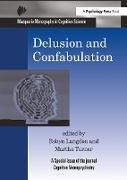Read more
People with psychiatric and neurological illness sometimes say and think the most amazing things. They might believe they are dead; claim to see, despite being blind; or "remember" things that never happened. Historical demarcations between academic disciplines dictate that these are distinct clinical phenomena - delusions versus confabulations;
List of contents
R. Langdon, M. Turner, Delusion and Confabulation: Overlapping or Distinct Distortions of Reality? M.D. Kopelman, Varieties of Confabulation and Delusion. A. Fotopoulou, The Affective Neuropsychology of Confabulation and Delusion. K. Metcalf, R. Langdon, M. Coltheart, The Role of Personal Biases in the Explanation of Confabulation. G. Dalla Barba, M.F. Boissé, Temporal Consciousness and Confabulation: Is the Medial Temporal Lobe "Temporal"? A.R. O’Connor, C. Lever, C.J.A. Moulin, Novel Insights into False Recollection: A Model of Déjà Vécu. A. Gilboa, Strategic Retrieval, Confabulations and Delusions: Theory and Data. V.J. Carr, Beauty and Belief: William James and the Aesthetics of Delusions in Schizophrenia. R.E. Cox, A.J. Barnier, Hypnotic Illusions and Clinical Delusions: Hypnosis as a Research Method. W. Hirstein, The Misidentification Syndromes as Mindreading Disorders. M. Coltheart, P. Menzies, J. Sutton, Abductive Inference and Delusional Belief. R. McKay, M. Kinsbourne, Motivational Factors and False Claims. R. Langdon, T. Bayne, Delusion and Confabulation: Mistakes of Perceiving, Remembering and Believing. M. Turner, M. Coltheart, Confabulation and Delusion: A Common Monitoring Framework?
Summary
People with psychiatric and neurological illness sometimes say and think the most amazing things. They might believe they are dead; claim to see, despite being blind; or "remember" things that never happened. Historical demarcations between academic disciplines dictate that these are distinct clinical phenomena – delusions versus confabulations;

